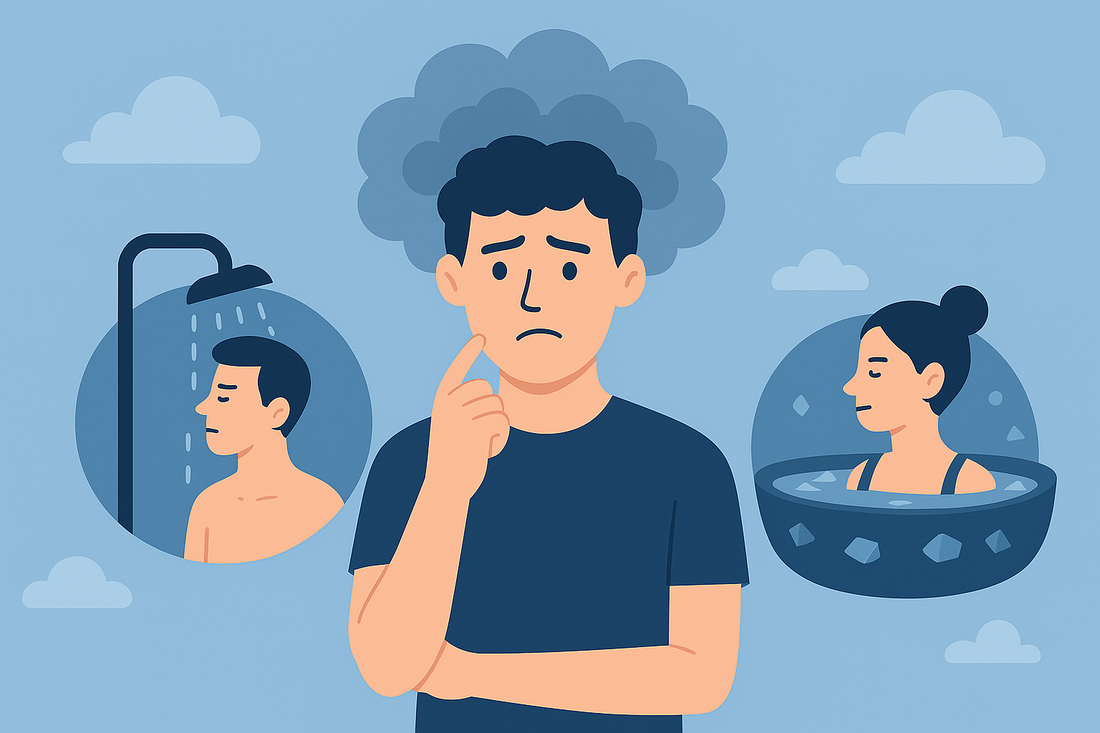
Can Ice Showers & Ice Baths Improve Focus and Mental Clarity?
Can Ice Showers & Ice Baths Improve Focus and Mental Clarity?
In a world packed with mental noise—digital distractions, constant stimulation, and the weight of daily demands—clarity can feel elusive. But what if the key to sharper thinking wasn’t in another productivity hack, but hidden in something far colder? 🧊
❄️ The Cognitive Wake-Up Call
Stepping into icy water isn’t just a test of resolve—it’s a neurological wake-up. Cold exposure activates the sympathetic nervous system, flooding the body with noradrenaline and dopamine—powerful neurotransmitters linked to attention, motivation, and alertness.
Here's what happens inside your brain:
- Noradrenaline surge → heightened vigilance and sharper awareness
- Dopamine boost → increased motivation and improved mood
- Reduced rumination → narrowed focus and less mental clutter
Far from anecdotal, research suggests brief cold exposure can enhance executive function, improve reaction time, and stimulate clarity.
🧊 When & How Long: Timing Makes a Difference
⚡ Ice Showers (30–40 seconds)
- Great for a quick neurological reset
- Stimulates the stress response without overwhelming the system
- Especially effective on sluggish mornings or before mentally demanding tasks
🧊 Ice Baths (2–4 minutes)
- Offers deeper immersion and longer-lasting benefits
- Intensifies dopamine release and brings calm focus afterward
- Best in the morning, when cortisol levels naturally rise—this pairing optimizes alertness and builds resilience for the day ahead
Whether it's a 40-second blast or a 4-minute plunge, both rituals can sharpen the mind—your choice depends on how much time (and ice) you're ready to brave.
🧠 Strategic Uses by Goal
For Mental Clarity & Focus
- Cold showers (30–60 seconds) make for a quick dopamine lift before work
- Ice baths in the morning enhance creative focus and concentration
For Muscle Recovery
- Post-exercise plunges help reduce inflammation and speed up recovery
- Cold showers offer accessible recovery support with circulatory benefits
For Better Sleep
- Cool evening exposure soothes the nervous system and promotes deeper sleep
- Avoid overly intense sessions late at night—they can be overstimulating
For Stress & Emotional Resilience
- During stressful periods, cold therapy strengthens your nervous system
- Consistent practice builds grit and lowers anxiety over time
If You're Short on Time
- Cold showers are fast, free, and effective—great for travel or tight mornings
- Use them to build tolerance before progressing to full immersion
When You're Seeking Deeper Benefits
- Plunge baths deliver stronger physiological responses
- Ideal for biohackers, athletes, and those wanting full-body immersion and reset
💡 Real-World Insight
Entrepreneurs, creatives, and high performers use cold exposure as a mental launchpad. For them, cold isn’t punishment—it’s activation.
Top cognitive benefits:
- ✅ Enhanced concentration post-immersion
- ✅ Sharper decision-making and cognitive flow
- ✅ Less brain fog and more mental stability
Even brief exposures—30 to 90 seconds—can yield powerful clarity, especially when done consistently. This is where ice showers truly shine.
🧠 Discipline Through Cold
The daily ritual of stepping into discomfort builds psychological resilience. Over time, it retrains the nervous system and enhances your response to stress—turning chaos into control, anxiety into presence.
⚠️ A Note on Safety
Cold therapy isn’t one-size-fits-all. If you have cardiovascular or circulatory conditions, consult a healthcare professional first. Start gradually, with cooler showers, and ease into full immersion under guidance.
🔍 Final Thought
If your mind feels foggy or overworked, maybe the answer isn’t louder noise or more stimulation—but silence from the cold. Ice showers and plunge baths challenge you, sharpen you, and leave you mentally clear. In today’s multitasking world, maybe it’s time to freeze—and focus.
